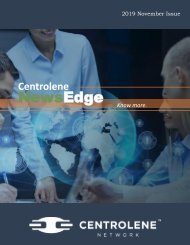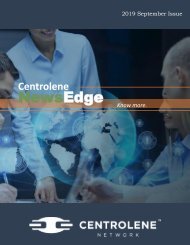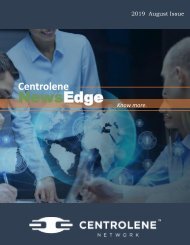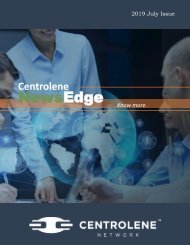Newsletter - October2019
Create successful ePaper yourself
Turn your PDF publications into a flip-book with our unique Google optimized e-Paper software.
2019 October Issue<br />
Centrolene<br />
NewsEdge<br />
Know more.
Centrolene<br />
NewsEdge<br />
Know more.<br />
Contents<br />
External Articles<br />
Freight sector concerned over<br />
new UK Customs system 3,4,5<br />
Thailand dangles 50% tax cut<br />
for manufacturers fleeing China 6,7<br />
Trade and the Impact on<br />
Imports and Exports in 2020 8,9,10<br />
Shifting tariff environment<br />
creating new opportunities for<br />
air freight 11,12,13<br />
No sign of gloom lifting for<br />
container sector 14,15<br />
Freight cost management<br />
market set for boom times 16,17<br />
Centrolene AGM2020 18<br />
FINALISTS at the Global<br />
Freight Awards 2019 (ICE) 19<br />
Centrolene Referrals Program 20<br />
Countries wanted:<br />
- Denmark<br />
- Indonesia<br />
- Tunisia<br />
Success project movement by<br />
by Hollandia Forwarding 21<br />
Centrolene Global Coverage 22,23
Centrolene<br />
NewsEdge Know more.<br />
Page: 4<br />
Freight sector concerned over new UK<br />
Customs system<br />
Source: Lloyd’s Loading List<br />
Date: 9 th September 2019<br />
BIFA says ‘progress has been inconsistent, with periods of activity and<br />
progress, and then little concrete news’, with concerns heightened by Brexit<br />
issues<br />
The British International Freight Association (BIFA) has expressed numerous<br />
concerns over the progress of the development of a new computer system<br />
that will replace an existing system used for processing Customs declarations.<br />
BIFA director general, Robert Keen said that with the freight and logistics<br />
sector facing numerous challenges including the increasing likelihood of a nodeal<br />
Brexit, and the demands that it will put on the companies that are<br />
responsible for moving the UK’s visible trade, BIFA is concerned that progress<br />
with the development of the new system has been inconsistent, with periods<br />
of activity and progress, and then little concrete news.<br />
Keen stated: “Our single greatest concern is that currently the development<br />
process does not involve representatives of the end-user. This is a dangerous<br />
oversight because it is the end-user who will determine what will actually<br />
work in practice, particularly as IT developers have been flagging up a lack of<br />
clarity regarding data elements.<br />
“To give a simple example, LIC 99 – which indicates a licence waiver for all<br />
types of goods – is to be replaced. The new requirement will be for a licence
Centrolene<br />
NewsEdge Know more.<br />
Page: 5<br />
waiver for individual types of licences, which potentially adds complexity and<br />
makes entry completion more difficult in practice.<br />
“Furthermore, despite initial assurances from HMRC to the contrary, it is clear<br />
that the new system will require more significant changes to commercial<br />
software systems than previously envisaged. To give a simple example, a<br />
declaration on the current system –Customs Handling of Import and Export<br />
Freight (CHIEF) – requires the completion of 59 data fields. A declaration on<br />
the replacement system – Customs Declaration System (CDS) – will consist of<br />
78 data fields for import and 65 for export declarations.”<br />
The development of the new system includes many stakeholders – HMRC,<br />
IBM, community systems providers (CSPs), numerous software providers and<br />
representatives.<br />
Keen noted that some of the CSPs and software providers have already<br />
highlighted the difficulties faced in developing the new system, the distinct<br />
lack of clarity regarding some of the data elements and the incomplete nature<br />
of some of the development work. For BIFA, there is a clear indication that the<br />
IT sector has concerns regarding the programme and the suggested<br />
timeframes.<br />
He said: “HMRC has recently announced its proposed plan for completing<br />
delivery of the new Customs Declaration System and migrating traders to the<br />
new platform, which requires all traders to migrate from CHIEF to CDS by<br />
September 2020 in order for HMRC to meet its requirement to turn off CHIEF<br />
in March 2021 when the current contract ends.<br />
“We have heard from CSPs and other software developers, and HMRC itself,<br />
that this timeline is challenging and understand that HMRC has requested<br />
software developers and CSPs to expedite their plans to deliver and assure the<br />
necessary changes to IT systems and business processes without
Centrolene<br />
NewsEdge Know more.<br />
Page: 6<br />
compromising the integrity of the border, or the flow of international trade.”<br />
Based on currently available information, BIFA is challenging HMRC, in<br />
conjunction with the IT sector, to identify all the problem areas and formulate<br />
a plan to resolve them, whilst agreeing a realistic timeframe to deliver the<br />
new system, fully developed, stable and tested. It also wants urgent<br />
consideration to be given to involve end-users to ensure that the outcomes<br />
actually work in practice.<br />
Keen added: “Everyone concerned needs to remember that developing the<br />
new core system is only one part of a much bigger jigsaw. Customs agents will<br />
have to collect significantly greater amounts of data from their customers.<br />
Also, within individual data fields we see an increase in options.<br />
“For instance, as previously indicated, LIC99 is a single licence waiver covering<br />
all goods. It is thought that this code will be replaced by multiple options<br />
dependent on the type of licence waiver being claimed. We are encouraging<br />
our members to consider how they will collect and store this additional<br />
information from clients, who often are not fully aware of the new<br />
requirements.<br />
“On top of all these issues, we have to factor in the increasing likelihood of a<br />
no-deal Brexit, and the demands that it will put on our sector. In this scenario<br />
it has to be accepted by all that the implementation of CDS will have to be<br />
delayed, whilst we are using existing systems to facilitate cargo movements<br />
and communicating with the various government agencies to allow them to<br />
perform their role to collect revenues without compromising the integrity of<br />
the border, the flow of international trade, or frontier security.”
Centrolene<br />
NewsEdge Know more.<br />
Page: 7<br />
Thailand dangles 50% tax cut for<br />
manufacturers fleeing China<br />
Source: Nikkei Asian Review<br />
Date: 6 th September 2019<br />
Bangkok seeks to draw high-tech production in competitive region<br />
BANGKOK -- Thailand announced a package of incentives Friday, including a<br />
50% tax cut, for companies to relocate production to the slowing Southeast<br />
Asian economy from China amid the Sino-American trade war.<br />
To qualify for the incentives, companies must apply next year for approval to<br />
invest 1 billion baht ($32.7 million) or more in the country and carry out the<br />
investment by 2021.<br />
Approved investors will see their corporate tax obligations reduced by half for<br />
five years.<br />
The incentives show Thailand jockeying for foreign investment against<br />
neighbors like Vietnam as the country seeks to move its manufacturing sector<br />
into higher-value activities.<br />
Forty-eight multinationals including U.S. chipmaker Western Digital are<br />
considering relocating production to Southeast Asia from China, Thailand's<br />
Office of the National Economic and Social Development Council says.
Centrolene<br />
NewsEdge Know more.<br />
Page: 8<br />
Ten of these companies are strong candidates for investment in Thailand,<br />
according to the office.<br />
"Under the new package, Thailand can compete with other countries in Asia<br />
for foreign investment, especially to attract advanced technology firms that<br />
want to move production to Thailand," Kobsak Pootrakool, an official in the<br />
prime minister's office, said at an economic policy meeting on Friday.<br />
Beyond offering a tax cut, the government also will create a single portal that<br />
advises companies on their applications and allows them to file.<br />
To encourage training of skilled workers, tax breaks will be offered to offset<br />
the cost of building training centers and providing employee development<br />
programs. Labor rules will be eased to help skilled foreigners work in Thailand.
Centrolene<br />
NewsEdge Know more.<br />
Page: 9<br />
Trade and the Impact on Imports and<br />
Exports in 2020<br />
Source: Global Trade Magazine<br />
Date: 11 th September 2019<br />
Significant and sustained increases in the world trade index (an index<br />
measuring the number of times the word uncertainty or its variants are<br />
mentioned in Economist Intelligence Unit (EIU) reports at a country level)<br />
should be a worry for many as “the increase in trade uncertainty observed in<br />
the first quarter could be enough to reduce global growth by up to 0.75<br />
percentage points in 2019”<br />
In August, the US Institute for supply management latest report shows a<br />
contraction in production, purchasing, and employment indices.
Centrolene<br />
NewsEdge Know more.<br />
Page: 10<br />
Uncertainty generated from Brexit, theUS-China trade war, Japan – South<br />
Korea trade wars, and general discontentment with global trend towards<br />
widening income inequality is creating a toxic mix for politicians to deal with.<br />
The irony is the conventional approach of blaming your trading partners for<br />
your problems is only likely to exacerbate a general lack of confidence and<br />
increase further uncertainty.<br />
The current round of the G7 summit in Biarritz concluded with support “to<br />
overhaul the WTO to improve effectiveness with regard to intellectual<br />
property protection, to settle disputes more swiftly and to eliminate unfair<br />
trade practices.” In essence, it’s signaling a need to strengthen the capabilities<br />
of the WTO to act faster and more decisively in resolving disputes that are<br />
even more political than structural in nature, requiring a more multi-faceted<br />
engagement approach. Whilst this may help in the long-run, in reality,<br />
companies will have to contend with uncertainty in global trade for some time<br />
to come as well as the impacts on the real economy from these disputes.<br />
And all of this is happening as IMO 2020 approaches, the January 1, 2020,<br />
date by which the International Maritime Organization mandates a switch to<br />
lower sulfur fuels in order to achieve an 80% reduction in sulfur emissions<br />
leading to significant cost increases in the shipping goods via ocean freight<br />
(initial estimates between 180USD – 420 USD per TEU dependent on routing,<br />
base fuel costs, carrier).<br />
So given the significant uncertainty around global trade agreements, the<br />
increasing use of trade as a political football, the increasing costs to trade and<br />
the shortening of product lifecycles as customers want faster, newer more<br />
differentiated offerings. Is it still worth it?<br />
Of course this is very much dependent on what industry you are in. Whether<br />
you’re a global manufacturer or a wholesaler sourcing goods, your<br />
perspectives may be different based on investments made, sensitivity to
Centrolene<br />
NewsEdge Know more.<br />
Page: 11<br />
current trade/tariff measures, customer demands, your markets, and the<br />
degree to which you are exposed to political debate and targeting.<br />
However, I would offer that the benefits of specialization, economies of scale<br />
and unique factors of production that have underpinned global trade still exist<br />
as Adam Smith put it in 1776:<br />
“By means of glasses, hotbeds, and hot walls, very good grapes can be raised<br />
in Scotland, and very good wine too can be made of them at about thirty<br />
times the expense for which at least equally good can be brought from foreign<br />
countries. Would it be a reasonable law to prohibit the importation of all<br />
foreign wines, merely to encourage the making of claret and burgundy in<br />
Scotland?”<br />
Today this simple analogy still holds true in skills, competences, capabilities,<br />
and access to markets and insights so that over time the expectation is that<br />
trade will prevail.<br />
While the recent outlook has been gloomy, opportunities for 2020 include a<br />
resolution to a number of ongoing disputes and a final settlement on Brexit<br />
(we hope). Additionally, the maturation in technologies such as blockchain,<br />
process automation, forecasting and demand management solutions can also<br />
offset costs associated with IMO and support greater agility in the uncertain<br />
supply-chain world that we currently live in.<br />
Indeed, if 2019 was the year of trade uncertainty, 2020 could be a restorative<br />
year in our ability to execute global trade.<br />
Partnering with an experienced supply chain leader will be essential to<br />
minimizing cost increases while ensuring the efficient flow of your company’s<br />
goods and services.
Centrolene<br />
NewsEdge Know more.<br />
Page: 12<br />
Shifting tariff environment creating<br />
new opportunities for air freight<br />
Source: Lloyd’s Loading List<br />
Date: 20 th September 2019<br />
Trump decision this month to delay 30% tariff list to 15 October likely to lead<br />
to further adjustments to freighter schedules, notes forwarder Flexport<br />
US President Donald Trump’s decision last week to delay to 15 October the<br />
implementation of new 30% tariffs on a list of imports from China is likely to<br />
lead to further adjustments and fine-tuning of orders and freighter schedules,<br />
according to freight forwarder Flexport, and is a further example of how the<br />
rapidly shifting tariff environment is creating some new opportunities for air<br />
freight.<br />
In the latest twist in the tit-for-tat game of tariff announcements and<br />
increases between the United States and China, Trump said on 12 September<br />
that the 30% tariff affecting List 1, 2, and 3 goods – set to take effect on 1<br />
October – would be delayed to 15 October “as a gesture of goodwill” toward<br />
China. The first week of October, known as Golden Week, is a national holiday<br />
across the country, with Trump stating that moving the tariff deadline came at<br />
the request of China’s vice premier Liu He, to avoid any interference with the<br />
country’s celebrations.<br />
Flexport noted that with negotiations between the US and China set to<br />
resume in early October, this delay may give both parties time to come to an<br />
agreement and avoid the tariff increases altogether. According to Flexport vice<br />
president of customs and trade advisory, Tom Gould, this announcement may
Centrolene<br />
NewsEdge Know more.<br />
Page: 13<br />
also have a significant impact in terms of cost savings – to the tune of 5% for<br />
15 days on Lists 1, 2, and 3 goods.<br />
“As with the September 1 tariff implementation, the new October 15 deadline<br />
will likely see freight forwarders adjusting air shipments to accommodate lastminute<br />
imports ahead of rising rates,” Flexport noted. Flexport’s air freight<br />
service provided one such service prior to 1 September – a previous tariff<br />
deadline – rescheduling the arrival of a HKG-ORD flight to land at 23.45 on<br />
31August, “saving customers time and money”.<br />
Gould commented: “The unpredictable nature of the trade war puts a<br />
premium on a freight forwarder’s agility and ability to develop flexible<br />
solutions to best serve customers. As circumstances surrounding upcoming<br />
tariffs continue to change, forwarders must be willing to go above and beyond<br />
to serve their clients as the situation evolves and hopefully reaches a<br />
resolution.”<br />
Flexport said the rapidly changing tariff environment had presented new<br />
opportunities to use air freight, as businesses investigate alternative options<br />
for manufacturing and shipping.<br />
“Trade regulations and tariffs have created an intriguing landscape for<br />
companies worldwide,” said Alexis Boutet, senior director of global airfreight<br />
strategy at Flexport. “We are gradually beginning to see global companies<br />
realign their supply chains to avoid losing money. For these businesses,<br />
airfreight delivers the agility to quickly complete these moves and minimize<br />
downtime.”<br />
As companies seek to build footprints in emerging markets, air freight offers<br />
the opportunity to quickly and efficiently relocate equipment necessary for<br />
manufacturing, Flexport noted, adding: “For companies weighing the costs of<br />
continued high tariffs against opening manufacturing facilities in an emerging<br />
market, air freight presents a compelling option.
Centrolene<br />
NewsEdge Know more.<br />
Page: 14<br />
“Relocating an entire manufacturing production facility often requires moving<br />
heavy machinery and putting production on hold. Moving this equipment via<br />
ocean exposes a business to the common pitfalls of container shipping: port<br />
congestion, longer transit times, and more.<br />
“More importantly, however, ocean transport puts a facility out of operation<br />
for weeks, if not months. With airfreight, however, necessary equipment can<br />
be moved and back up and running in days.”<br />
Flexport highlighted a number of moves by companies in response to<br />
changing US-China tariffs. For example, diesel engine manufacturer Cummins<br />
Inc reported $50 million in avoided tariffs by shifting production from China to<br />
India and other nations, while footwear brand Crocs expects less than 10% of<br />
its imports in 2020 to come from China.<br />
In a guide entitled ‘The Agile Supply Chain: Leveraging Airfreight Strategically’,<br />
Flexport said shifting exports was one method companies have used to help<br />
mitigate exposure to tariffs, with air freight used by some to make this<br />
possible, by quickly relocating sourcing or production processes to new<br />
locations.<br />
But for many businesses, it said the challenge of rising tariffs may lie less in<br />
the increasing costs “and more in the potential for reducing shipment delays”,<br />
adding: “With each tariff announcement, a surge of Chinese exports follows,<br />
as businesses aim to get their goods to the US ahead of implementation, at a<br />
lower rate. In these instances, airfreight can also help companies avoid makeor-break<br />
scenarios caused by port congestion.”<br />
It continued: “Unlike the expected crunches of peak season, increased<br />
congestion caused by tariffs is shaping up to be an unpredictable, long-term<br />
concern. With this in mind, more businesses are beginning to lean more<br />
heavily on-air freight to keep things moving.”
Centrolene<br />
NewsEdge Know more.<br />
Page: 15<br />
No sign of gloom lifting for<br />
container sector<br />
Source: Lloyd’s Loading List<br />
Date: 19 th September 2019<br />
Carriers are already struggling with a weak market. But a global<br />
manufacturing slowdown means there a few signs of relief in sight<br />
Slowing intra-Asia trade points to a difficult remainder of the year for the<br />
wider container shipping sector, according to a new report from BIMCO.<br />
“Growth rates on intra-Asian container trades are viewed as an indicator of<br />
what is to come on long-haul routes, as volumes here indicate the health of<br />
supply chains in the region and therefore what finished goods are likely to be<br />
exported from Asia in the near future,” BIMCO said.<br />
“With a volume growth rate of 0.8% in the first seven months of 2019, low<br />
growth levels can be expected in global demand for container shipping for the<br />
remainder of the year.”<br />
The continued slowdown in global manufacturing and the broader global<br />
economy will also affect container shipping, with BIMCO expecting the GDP<br />
multiplier to stay around one for the foreseeable future.<br />
“The slowing demand growth means that despite the comparatively low fleet<br />
growth expectations which of 3.5%, the fundamental balance of the container<br />
shipping market will worsen this year,” BIMCO said.
Centrolene<br />
NewsEdge Know more.<br />
Page: 16<br />
“Furthermore, with the fleet currently projected to grow by 3.2% in 2020 this<br />
is unlikely to change much next year, with the industry heading deeper into a<br />
hole.”<br />
Cutting costs would remain the main focus if carriers are to weather the<br />
storm, it added.<br />
“Adding to the worsening of the fundamental balance, the added fuel costs<br />
due to the 2020 sulphur cap paints a disturbing picture for the rest of the<br />
2019 and 2020 for container shipping,” BIMCO said.<br />
“The oversupply of capacity is likely to make it difficult for shipowners to<br />
recover the additional fuel costs.”
Centrolene<br />
NewsEdge Know more.<br />
Page: 17<br />
Freight cost management market<br />
set for boom times<br />
Source: Lloyd’s Loading List<br />
Date: 20 th September 2019<br />
Rise in data volumes and increased complexity of supply chain across<br />
industries push the need for advanced processing solutions, set to triple in<br />
size by 2025<br />
Europe’s freight cost management (FCM) market is set to expand rapidly in<br />
the next few years, as small to medium enterprises (SMEs) increasingly<br />
digitise their time-consuming invoice verification and claims management<br />
processes.<br />
Analysis by Frost & Sullivan reveals that owing to these development, the<br />
region’s freight cost management market is poised to register a compound<br />
annual growth rate (CAGR) of 17.4%, with gross market revenues predicted to<br />
rise from €484 million in 2018 to approximately €1.49 billion by 2025.<br />
“So far, there has been a lack of transparency and ineffective communication<br />
between shippers and carriers in the end-to-end supply chain process,” said<br />
Krishna Chaithanya Bathala, Industry Analyst for Automotive & Transportation<br />
at Frost & Sullivan.<br />
“However, with the emergence of freight cost management solutions<br />
powered by digital technologies, the shippers’ capability in data warehousing<br />
and benchmarking carriers’ performance has been enhanced.”
Centrolene<br />
NewsEdge Know more.<br />
Page: 18<br />
Frost & Sullivan’s latest study, European Freight Cost Management Market,<br />
Forecast to 2025,examines the overall freight cost management market in<br />
Europe. The research offers analysis of the current market scenario and<br />
provides strategic observations and insights for companies that want to<br />
venture or expand into this sector.<br />
While the FCM market is dominated by legacy participants such as SAP,<br />
Oracle, and JDA, which hold a combined market share of about 55%, it will still<br />
remain attractive for niche participants like the Alpega Group, Eyefreight, AEB,<br />
and LOCOM, the report notes, adding: “Their cost-competitiveness,<br />
adherence to changing requirements, capability to offer personalised services,<br />
and new business models are better suited to the needs of SMEs, offering<br />
significant room for the penetration of FCM tools.”<br />
Suriya Anjumohan, Industry Analyst for Automotive & Transportation at Frost<br />
& Sullivan, commented: “Going forward, agility, cost, and speed will be the<br />
top three determining factors for vendor selection in the FCM service market.<br />
Service personalisation and the ability to quickly attend to change requests<br />
from customers will help in gaining a competitive advantage in the industry.”<br />
The report suggests that companies operating in the FCM market should<br />
explore the growth opportunities by:<br />
• Partnering with niche companies rather than legacy participants, which<br />
will facilitate easy onboarding of SMEs due to their highly costcompetitive<br />
offerings.<br />
• Developing or acquiring blockchain capabilities with smart contracts<br />
solutions, which will increase transparency in freight audits, secured<br />
payments, and record management.<br />
• Offering increased process automation capabilities, which enable<br />
companies to improve cost efficiencies by allowing for electronic<br />
submission, processing, and clearance of invoices from carriers.<br />
• Deploying artificial intelligence and data analytics to support effective<br />
freight risk management and freight cost analysis.
Centrolene Network AGM 2020<br />
A successful Centrolene AGM 2019 has just ended in February. While we are busy<br />
following up each and every business generated from the AGM, Centrolene would<br />
like to again invite you to save the date to join the exclusive group of your peers<br />
from the leaders of freight logistics industry from 8th to 10th March 2020 for<br />
industry updates and most importantly, NETWORKING!<br />
As usual, space will be limited so make plan now to be at this exclusive meeting.<br />
Phuket, Thailand has been chosen and conference venue will be announced very<br />
soon.<br />
Please do not hesitate to contact Anna Neo, anna@centrolene.com if you have<br />
questions about Centrolene AGM 2020.
Denmark<br />
Indonesia<br />
Tunisia<br />
Members wanted in Denmark,<br />
Indonesia and Tunisia<br />
3 simple steps to get rewarded<br />
Refer Join Reward
Hollandia<br />
Forwarding B.V.<br />
Breguetlaan 12A 1438 BC Oude meer<br />
The Netherlands<br />
Consignment was designated for an offshore project where<br />
Hollandia has loaded the cargo at the Saipem 7000 Vessel in<br />
Rotterdam with their owned truck.<br />
5 steel plates with a total of 3,418 kg which they sent by airfreight<br />
to final destination.
Centrolene Glob<br />
Centrolene<br />
NewsEdge<br />
Know more.<br />
Centrolene Members<br />
Looking for Members
Centrolene<br />
NewsEdge Know more.<br />
Page: 23<br />
al Coverage
2019 October Issue<br />
Centrolene<br />
NewsEdge<br />
Know more.
















